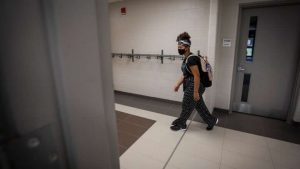Ontario’s back-to-school plan has no mandatory COVID-19 testing. Here’s why experts say it’s the right call

Despite some two million Ontario students heading back to school this month amid a global pandemic, the provincial government says there is no scenario in which a student will be required to take a COVID-19 test.
The omission of mandatory school testing was confirmed in Ontario’s updated school reopening guidelines released last week, which appeared to come as a surprise to many parents and observers.
The decision was the focus of numerous headlines, while some on social media expressed surprise that mandatory testing would not be a requirement for students with symptoms, or used as a tool for proactive screening.
However, the province’s strategy has the support of multiple public health and medical ethics experts interviewed by CBC Toronto, who say Ontario’s decision to forgo mandatory COVID-19 testing in schools is appropriate, at least for the time being.
Under the province’s latest reopening guidelines, parents and educators will be asked to screen for COVID-19 symptoms and keep children out of class if they are displaying a possible infection. Other students who come into contact with a known case of the disease will also be directed to self-isolate for 14 days.
In those scenarios, students may be advised to be tested by a health-care provider, but they will never be required to show proof of a negative test result before returning to class after their period of self-isolation.
Experts warn of uncertainties, ethical considerations
“Mandatory testing in some cases is quite beneficial. In school-aged children I think we have to be a bit more cautious,” said Dr. Nitin Mohan, a physician epidemiologist and assistant professor at Western University.
While Mohan said mandatory testing could, “in theory,” be an effective way to contain the spread of the coronavirus in schools, he said there are many uncertainties that make the reality more complicated.
Primarily, he pointed to inevitable false positive results and a lack of research on how the virus spreads among children.
Properly screening for symptoms will likely be more effective than relying on test results, he explained.
“Mandatory anything in health care — unless you really, really have to do it — it’s often best to avoid it,” said Kerry Bowman, a bioethicist at the University of Toronto.
He said it’s hard to make a case for strict mandatory testing since so little is known about its benefits, though he acknowledged there is no single correct answer.
“It’s emotional,” Bowman said. “We’ve never been in this position before.”

till, others say a policy for mandatory testing may contribute to keeping schools safe.
“I think mandatory testing across the board would be a good thing and add another layer to the safety protocols that are being put in place,” said Sam Hammond, president of the Elementary Teachers’ Federation of Ontario.
No Canadian jurisdictions have any form of mandated testing for students, and the strategy has not been widely adopted in other countries. Some German states reportedly introduced regular mandatory testing for students in the spring.
Better alternatives may be available
While none of the experts expressed outright opposition to the idea of mandatory testing, most said other strategies have a more realistic chance at preventing outbreaks.
The prospect of mandatory testing as a form of proactive screening — in which students would be randomly tested regardless of their symptoms — was also described as costly and burdensome.
Dr. Peter Juni, a University of Toronto professor and the executive director of Ontario’s COVID-19 science advisory table, estimated that testing each student weekly would cost about $4 billion annually and far exceed the province’s current testing capacities.
“If we were to do [testing] at the level of all students, it would simply not be possible,” he said.
“We need to find a way that doesn’t overburden the children, the school and the public health system. This needs a lot of creativity, and I don’t think we have all the answers yet.”
Experts say there are promising strategies in development that could both prevent outbreaks and also provide public-health officials with information about the prevalence of COVID-19 in schools.
Juni pointed to the emerging tactic of wastewater testing, in which health officials sample a location’s wastewater for the presence of COVID-19. Positive test results can signal a possible outbreak more efficiently than individually testing all the people at a given location, he explained.
An approach like wastewater testing could provide many of the benefits of mandatory testing without the associated problems, Juni said, though he cautioned that it’s not yet clear if Ontario has the capability to introduce it on a wide scale.








Redes Sociais - Comentários